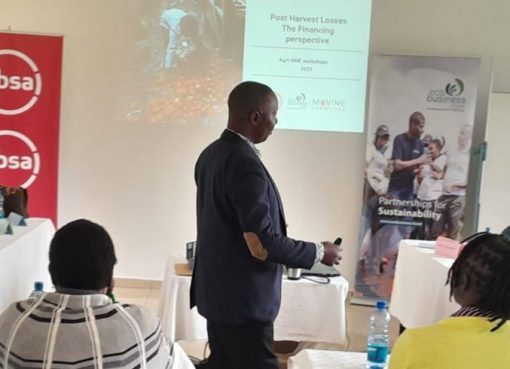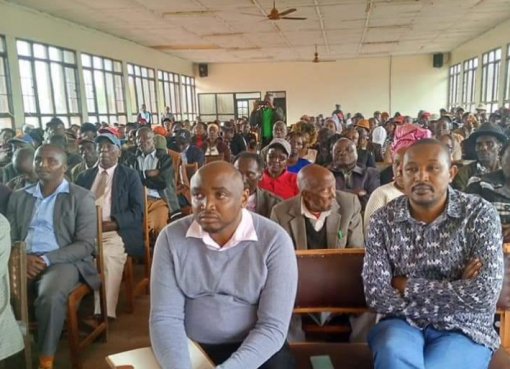Government is negotiating with various foreign countries to ease barriers hindering Kenyan exporters from accessing various global market segments.
The Principal Secretary for Trade (PS), Chris Kiptoo on Thursday said Kenya is grappling with a huge trade imbalance hence leading to flooding of local market by foreign goods.
“Imports into our country are three times our exports. We are handicapped in terms of low production and the products are not value added denying exporters premium returns in the international markets. In the recent past we have been engaging various international Governments to negotiate for low tariffs,” said Dr. Kiptoo.
According to the Economic Survey 2019, Kenya exported goods worth Sh541.5 billion against imports of Sh1.7 trillion.
Most of the exports include agricultural produce –tea, horticultural produce, articles of apparel and clothing accessories, coffee and tobaccos and tobacco manufactures.
Speaking when launching the Kenya Plant Health Inspectorate Service (KEPHIS) 2017/18-2021/22 strategic plan, Kiptoo said in order to tame the huge imbalance, government recently enacted a trade policy and added as part of implementing the policy, and Government will establish an export delivery unit among other mechanisms.
The unit, he said is being established with the assistance of trade market East Africa and other Government agencies.
As the private sector pushes the Government to put restrictions, Kiptoo stated trade between and other countries is guided by rules under the World Trade Organization (WTO).
To enhance value addition the PS stated Government is implementing the manufacturing strategy over and above attracting foreign investors and thus strengthen the local market competitiveness.
More than 70 percent of our commodities are exported to less than 10 countries –Pakistan, USA, Netherlands, United Kingdom, Germany, Uganda, Tanzania, Egypt, United Arab Emirates and Rwanda.
Under the national export strategy, Kiptoo said the focus is to diversify exports in addition to consolidating the traditional markets.
The PS further said the Government will continue to facilitate exporters to exploit various global trade arrangements, for example, African Growth and Opportunity Act (AGOA) implemented by the US Government and various regional blocs –Common Market for Eastern and Southern Africa (COMESA), European Union and African Continental Free Trade Area. Government is scouting for new export destinations in the entire Asian region.
The PS noted that in the recent past various export destinations like China, Mauritius and Australia issued stringent rules for Kenyan exports a situation which he explained that Government has taken up and is engaging the countries.
“For instance, China is charging Kenyan agricultural produce 30 percent over other conditions like exporting frozen avocados and we are in consultation and we want the tariff to be lowered”, he said .
EU countries of late have also issued new conditions while zero pest tolerance on exports mainly flowers took effect on September 1, 2019 in Australia. Australian Government wants local flower exporters to fumigate flowers at source.
The Uasin Gishu Governor, Jackson Mandago decried low allocation of resources to the counties despite devolvement of agriculture functions.
“Although agriculture was devolved we should ask ourselves whether the resources were also devolved and how much money used to go to the ministry before devolution and how much is going to the ministry now after,” said Mandago.
He said the lack of funding has led to low employment of extension services and non-execution of other crucial services to the farmers.
Mandago called on youth to tap available opportunities with a view to earning impressive incomes from the agriculture.
“Youth should agree to work with counties as they are fast in technology, access of information and research,” he said.
He called on national Government to increase budgetary allocation to various agriculture agencies like KEPHIS in order to ensure all the wealth of ideas developed are implemented.
Dr. Esther Kimani, Managing Director KEPHIS said that the new strategic plan will see them strengthen partnerships with regional and international bodies for the benefit of clients and stakeholders.
“KEPHIS will continue to ensure the quality of our inputs, including seeds, fertilizers, water for irrigation suitability soils and pesticides formulation and this will be made possible through our accredited laboratories”, she said.
She explained that KEPHIS is also working with other agencies to ensure that the fight against introduction of harmful organisms into the country is enhanced through surveillance securities at border controls and this will be ensured as critical step towards protecting Kenya’s agriculture and plant environment.
Kephis, Dr. Kimani said has projected an ambitious budget of Sh7.8 billion to be implemented in the strategic plan that is running for 5 years.
By Wangari Ndirangu




